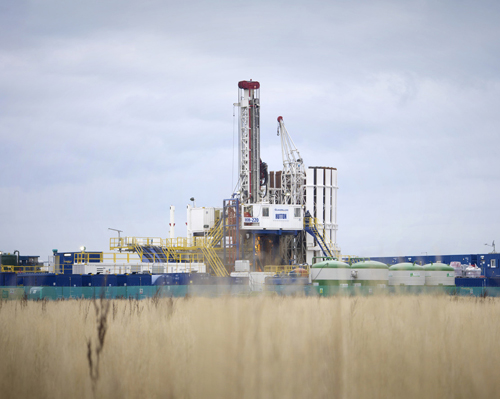
Classed as unconventional gas along with coalbed methane and so called 'tight' gas, shale gas is fast heading out of that category. In the USA it has already had a significant and irreversible effect on the economy, as evidenced by a recent report from consulting firm IHS which says the boom in domestic energy now directly or indirectly supports 1.2 million jobs and adds more than $1,200 to average disposable income – and that these figures will increase to 3.3 million jobs and $2,000 per household by 2020.
Technologies like hydraulic fracturing and horizontal drilling, which make it practical to recover previously unused oil reserves, have helped drive a 58 percent increase in natural gas reserves since 2007, cut the price of natural gas by nearly three-fourths, and sparked more than $120 billion in US based investment last year, according to the report.
With 665 trillion cubic feet (tcf) of technically recoverable shale gas (that is, gas accessible with current technology) the USA comes in fourth behind China, Argentina and Algeria, according to The United States Energy Information Administration (EIA). For the USA, though, the principal benefit is that shale gas looks like finally severing its dependence on imported hydrocarbons.
Whether it's in the UK, China or South Africa, all this upside depends on the use of hydraulic fracturing. Fracking has to be a contender for the most emotive word of 2013. On the one hand it could be a solution to the world’s energy problems, at least in the short term and potentially the stopgap that will allow us to enjoy cheap energy until the utopia of renewable self sufficiency makes fossil fuel a bad memory. On the other it will kill vegetation, pollute water sources and accelerate global warming. The famous earthquakes are the least of the publicly-aired problems.
However it is not a new technology, in fact dating back to the late 1940s. Fracking has a lot of advantages over conventional O&G development because it has a low surface impact, and once a well has been drilled it will go on producing for decades with very little maintenance. The tremors, if felt at all, will be insignificant to those associated with 'retreat' coal mining which has left its mark on the English Midlands. Environmental hazards are more serious, with the possibility of watercourse pollution and the escape of gas to the surface. With clear regulation and the adoption of well understood practices by the industry it should be possible to avoid the problems that have been reported in the USA.
The USA is becoming the benchmark for other countries fortunate enough to have significant shale gas reserves. The EIA made a first pass estimate of a technically recoverable resource of 485 tcf of gas in South Africa's Karoo Basin shale beds. Exactly how much of this is recoverable is not certain, but drilling and geophysical surveying is going ahead. As Mthozami Xiphu, Executive Director of the South Africa Oil & Gas Alliance (SAOGA) points out, even if the Karoo reserves amount to no more than 20 or 30 tcf their significance would be massive. “If we get a hundred or multiples of a hundred tcf we are looking at a game changer for energy in South Africa over the next ten years!”
In the UK, according to an Infrastructure for Business report published this year by the Institute of Directors (IoD), “shale gas could represent a multi-billion pound investment, create tens of thousands of jobs, reduce imports, generate significant tax revenue and support British manufacturing. It could potentially meet a third of the UK’s gas demand with a very small surface footprint, benefiting the environment at the same time.” This on a very conservative estimate of UK reserves (see Francis Egan's comments) at between 853 and 1,389 billion cubic feet (bcf). The IoD foresees 74,000 UK jobs supported by the industry; and “just as importantly, shale gas could support jobs in the chemical industry and wider manufacturing by providing secure energy and important feedstocks. This could help the UK to make more. In the US, PwC and Citi have estimated that at least one million new manufacturing jobs could be created over the next decade.” Britain would also share America's energy security, with dependency on imports reduced from 76% to 37% in 2030, while the cost of net gas imports in 2030 could fall from £15.6 billion to £7.5 billion (using 2012 prices).
Energy security is as important as energy cost – though there's no telling how disrupting the finely balanced global O&G markets will impact global political relations. In a Chatham House report The Shale Gas Revolution: Hype and Reality published at the end of 2012 Professor Paul Stevens warns that the US 'shale gas revolution' has created huge uncertainties for international gas markets. “If the revolution continues in the US and extends to the rest of the world, energy consumers can anticipate a future dominated by cheap gas. However if it falters and the current hype about shale gas proves an illusion, the world will face serious gas shortages in the medium term”
The case for UK shale gas
By Francis Egan
The potential to extract natural gas from shale onshore in the UK is an opportunity that goes beyond helping to secure Britain’s gas supply. This valuable resource can create jobs and provide economic benefits on a local and national scale.
The British Geological Survey recently published its estimate for the potential amount of shale gas in northern England, saying that there is 1,300 trillion cubic feet stored within the Bowland Shale Formation. If we can extract just ten per cent of this resource, it could meet the UK’s current gas demand for more than 40 years. Furthermore, at today’s gas prices, this recoverable ten per cent would have a market value of almost £1 trillion. With tax revenues from North Sea production in decline, Deloitte predicts a fall from £11.2 billion in 2011-12 to £3.7 billion in 2017-18, onshore gas production will help fill this gap by providing valuable funds to the Treasury.
The United Kingdom needs sustained economic growth of which job creation will play a key part. The Institute of Directors, in its recent report ‘Getting Shale Gas Working’ predicted that shale gas development could create 74,000 new jobs, spanning a wide range of disciplines including geology, drilling, accounting, IT, construction and many others.
The UK has the engineering, health, safety and environmental expertise, together with a robust regulatory framework, to develop its shale gas resources in a safe and responsible fashion. We have a great opportunity to become a world leader in shale gas development as long as we successfully tackle the unfounded scare stories concerning hydraulic fracturing. And Britain too would enjoy a huge energy security dividend.
Finally local communities will also benefit financially from potentially transformative funds in areas of shale gas production. Communities will receive £100,000 for every exploration well site that is hydraulically fractured in addition to one per cent of revenues from future shale gas production. This could equate to over £1 billion over a 20 to 30 year production timescale in Cuadrilla’s Bowland Basin licence area alone.
The business case for the safe, responsible and effective extraction of shale gas is solid and can generate real and long-lasting benefits for the UK. We need to get on with the job in hand of understanding exactly how much natural gas stored in shale rocks thousands of feet underground can be viably extracted.
Francis Egan is CEO of Cuadrilla Resources, an independent UK energy company led by a team of experts in unconventional sources of exploration.












